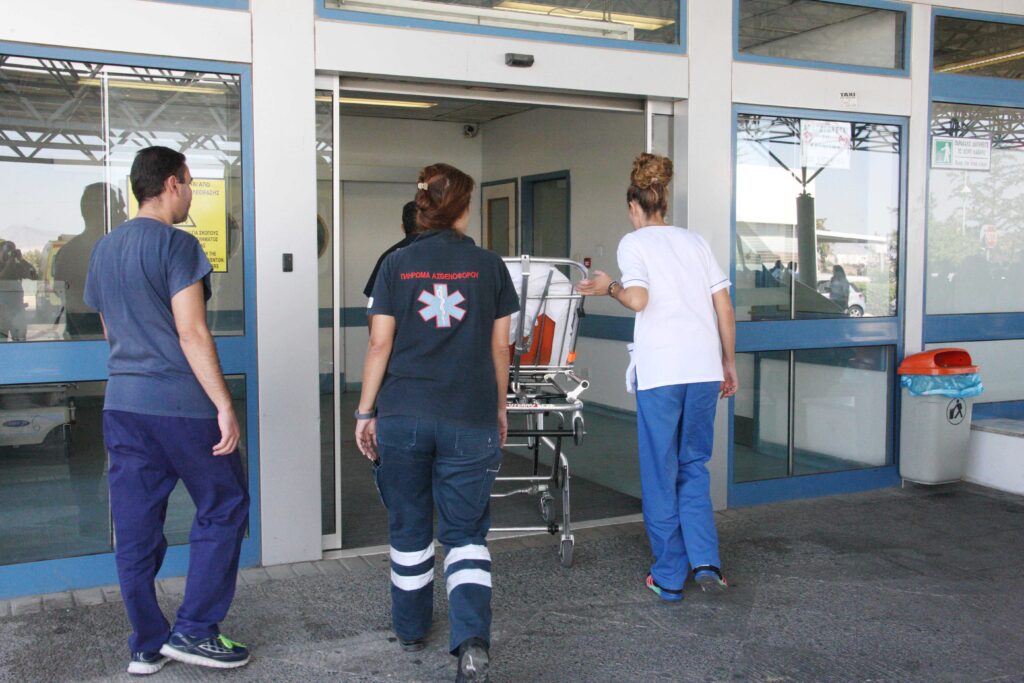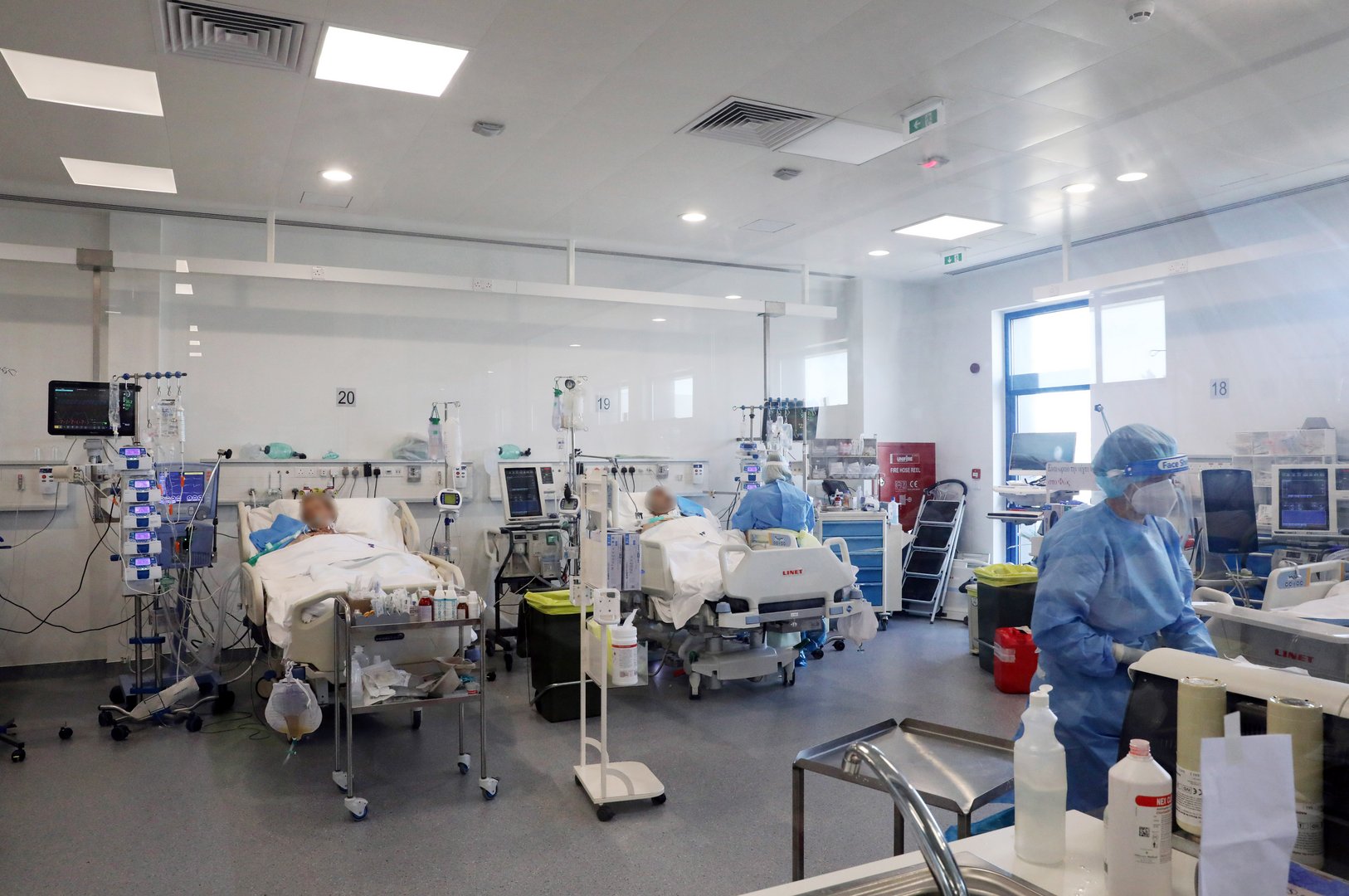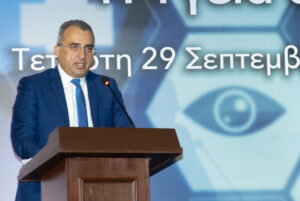Patients say they are suffering like never before
Patients are suffering the consequences of tensions between state health professionals and the organisation in charge of public hospitals which is itself plagued by internal issues.
Public hospitals are facing “serious issues, which [state health services organisation] Okypy is unable to resolve,” thus leading the state health facilities “downhill”, head of the federation of patients’ association Marios Kouloumas told the Sunday Mail.
“There is serious inability and disorganisation. It is impossible to respond to the needs of the patients,” he added.
Panayiota Socratous, 82, woke up in excruciating stomach pains the night she visited the Nicosia general hospital’s accident and emergency department last month but left before being seen due to the queue of people.
She found out from a private doctor she felt compelled to see instead, that she had large gallstones and needed an operation.
“I waited about three hours and left. I couldn’t take the pain anymore,” Socratous told the Sunday Mail.
“It was chaos, the waiting room was full, much more than it should with social distancing rules, with people of all ages screaming in agony,” said Socratous’ 56-year-old son, who drove her to the hospital.
According to Kouloumas, “whoever has an alternative choice does not visit the public hospitals.”
But what happens when there is no alternative, since not everyone has the money to go private?
Androulla Constantinou, 59, needs knee replacement surgery in both her legs. But she was told to be patient when she was put down on the operations waiting list in 2019.
“The doctor actually turned around and told me: ‘It doesn’t matter if I put you in the list, you will not get the surgery at the public hospital for years’. He was right but I couldn’t afford to do it privately,” Constantinou said.
These are problems that persist despite the coronavirus pandemic that has put additional strain on the hospitals, Kouloumas said, explaining that operations were delayed even prior to Covid due to the limited hours hospitals were operating.
“Nowhere else in the world do hospitals close at lunch time,” Kouloumas noted.
On top of that, there are issues related to patients’ access to medicine, doctors and lack of appropriate infrastructure as well as equipment shortage.
Changes that are underway to improve services in public hospitals, including expansion of operating hours until the afternoon and addressing the overcrowding at the A&E and are being held up by disagreements between the doctors and nurses and Okypy.
Pending a meeting of Health Minister Michalis Hadjipantelas and representatives of Okypy with President Nicos Anastasiades on Monday, state doctors’ union Pasyki on Friday asked for the intervention of the president for the change of administration of the organisation in charge of the state hospitals.
“The time has come to amend the legislation, which governs the operation of Okypy and the composition of the board of directors,” Pasyki said, accusing the organisation of acting with arrogance and authoritarianism “to impose anachronistic methods of administration”.
The doctors explained that the directorate of hospitals should be taken over by people with proven knowledge and experience in the sector of health services.
Meanwhile, the Sunday Mail has learned that a specific agenda for the meeting has not been determined, but Okypy was expected to update the president on current and coming actions.
The trade unions have also blamed Okypy for failing to communicate important decisions to its staff, thus creating operational issues.
“Unfortunately, there is no communication between Okypy, the hospital directors and trade unions, which shows lack of respect,” said the general-secretary of state nurses union Pasyno Panayiotis Georgiou.
Nurses at public hospitals have repeatedly complained about understaffing, an issue which is worse over the holidays, with employees forced to work double shifts to cover the ones on leave.
The problem lies partly on the global shortage in the nursing profession due to the pandemic, with efforts underway to implement a strategic plan to attract young people to study nursing.
However, the issue also appears to originate from the understaffing of Nicosia general hospital, where nurses from different districts are recruited and held ‘hostage’, Georgiou said.
“The hospital’s administration should have released some employees after new recruitments, but not everyone was released,” leading to a domino effect of understaffing in the rest of the public hospitals.
“Limassol was forced to get staff from Paphos hospital, Paphos took staff from Polis Chrysochou hospital which now does not operate,” Georgiou said.
Meanwhile in Nicosia, there are currently three ICUs that are treating Covid and non-Covid cases.
According to Georgiou, the first ICU has 17 beds operating with 60 nurses where it should be 75, second ICU has a 26-bed capacity and should ideally operate with 120 nurses but instead just 90 nurses worked there during the peak of the pandemic, while a third with 14 beds is operating with 40 nurses when 54 nurses are required.
Lack of staff also means that the hospitals cannot operate at their full capacity.
“Sometimes there is the infrastructure but not the staff, hence it is not used,” Georgiou said giving the example of Famagusta state hospital which has two fully equipped floors that are not been utilised because there is not enough personnel.
In response, Okypy spokesman Charalambos Charilaou said that since the implementation of the national health scheme (Gesy) in 2019, a total of 1,000 employees were hired, including more than 200 doctors and 400 nurses, raising the number of employees to about 7,000. “This is the first time that so many new hires took place,” Charilaou said.
Moreover, state hospitals also closed departments and wards to manage pandemic-related issues, thus there was a distribution of the staff.
“Okypy has drawn up a programme to better assist patients and we hope to have a positive outcome,” Charilaou said.
Doctors and nurses’ unions are currently evaluating a proposal by Okypy to allocate 20 per cent of revenues stemming from potential state hospital’s afternoon operations to state doctors.
“We have set up timelines for the various actions,” he said, adding that the organisation hopes to implement the afternoon operation of hospitals by the end of the year.
He said that, when the proposal is implemented, the working hours will be extended until 5.30pm or 6pm over the winter while during the summer the hours would be extended until 7pm.
Regarding the commotion at A&E, Charilaou said that there is a plan, already implemented, which aims to track the entire process from when the patient arrives at the hospital to the time they leave. “We hope that in this way we will reduce the waiting time and time of stay at A&E.”

The chaotic situation at the A&E departments is to be tracked and a plan developed based on the results
According to Okypy’s website, “the Accident and Emergency Department operates on a 24-hour basis, 365 days a year, for the immediate and complete response to emergencies” and “deals with more than 70,000 cases each year”.
Charilaou said there was already an improvement, with overcrowding mainly concentrating during peak hours such as weekends and overnight.
He also referred to Hadjipantelas’ comments, who explained the reasons behind the commotion earlier this week.
The minister said that some general practitioners (GPs) do not pick up the phone, or refer their patients to A&E. Moreover, people living in nursing homes and Athalassa mental hospital are also often forced to go to the accident and emergency departments as there is no GP at those facilities.
“We should have created some afternoon clinics…which we will examine in collaboration with the HIO [Health Insurance Organisation], and they will operate if needed,” Hadjipantelas had said.
“The organisation is promoting various changes, but any change spurs the respective reaction from the employees,” he said.
Last week, state doctors’ held a three-hour work stoppage claiming the organisation did not honour their contract. It later emerged that the reason behind the strike, which affected patients’ appointments and surgeries, was the failure of Okypy to pay some €150, on top of the doctors’ monthly salary.
The strike was supported by the Cyprus medical association, and state nurses’ union Pasyno who spoke about lack of cooperation between Okypy and the unions.
Speaking to the media, directors at public hospitals said they were not informed by the organisation on several issues, but at the same time are not allowed to be independent by having to contact Okypy to purchase medicines.
The president of Okypy employees branch and director of Larnaca and Famagusta hospitals George Karotsakis reported that he received threats from the organisation and in turn said he was willing to go to local or European courts with specific evidence.
Responding to the accusations, Charilaou said “there is communication and consultation both with the directors and employees,” and “decisions are taken together.”








Click here to change your cookie preferences